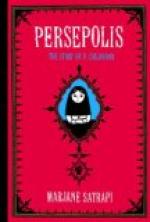The three were curiously unlike each other. One, “a little man of feeble make, who would be unhappy if his pony got beyond a foot pace,” slight, with “small, elegant features, hectic cheek, and soft hazel eyes, the index of the quick, sensitive spirit within, as if he had the warm heart of a woman, her genuine enthusiasm, and some of her weaknesses.” Another, as unlike a woman as a man can be; homely, almost common, in look and figure; his hat and his coat, and indeed his entire covering, worn to the quick, but all of the best material; what redeemed him from vulgarity and meanness were his eyes, deep set, heavily thatched, keen, hungry, shrewd, with a slumbering glow far in, as if they could be dangerous; a man to care nothing for at first glance, but, somehow, to give a second and not-forgetting look at. The third was the biggest of the three, and though lame, nimble, and all rough and alive with power; had you met him anywhere else, you would say he was a Liddesdale store-farmer, come of gentle blood; “a stout, blunt carle,” as he says of himself, with the swing and stride and the eye of a man of the hills,—a large, sunny, out-of-door air all about him. On his broad and somewhat stooping shoulders was set that head which, with Shakespeare’s and Bonaparte’s, is the best known in all the world.
He was in high spirits, keeping his companions and himself in roars of laughter, and every now and then seizing them, and stopping, that they might take their fill of the fun; there they stood shaking with laughter, “not an inch of their body free” from its grip. At George Street they parted, one to Rose Court, behind St. Andrew’s Church, one to Albany Street, the other, our big and limping friend, to Castle Street.
We need hardly give their names. The first was William Erskine, afterwards Lord Kinnedder, chased out of the world by a calumny, killed by its foul breath,—
“And at the touch of wrong,
without a strife,
Slipped in a moment out of
life.”
There is nothing in literature more beautiful or more pathetic than Scott’s love and sorrow for this friend of his youth.
The second was William Clerk,—the Darsie Latimer of “Redgauntlet”; “a man,” as Scott says, “of the most acute intellects and powerful apprehension,” but of more powerful indolence, so as to leave the world with little more than the report of what he might have been,—a humorist as genuine, though not quite so savagely Swiftian as his brother Lord Eldon, neither of whom had much of that commonest and best of all the humors, called good.
The third we all know. What has he not done for every one of us? Who else ever, except Shakespeare, so diverted mankind, entertained and entertains a world so liberally, so wholesomely? We are fain to say, not even Shakespeare, for his is something deeper than diversion, something higher than pleasure, and yet who would care to split this hair?




